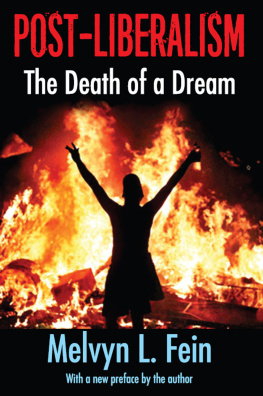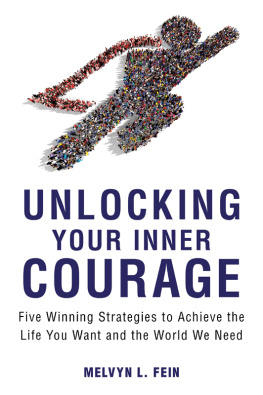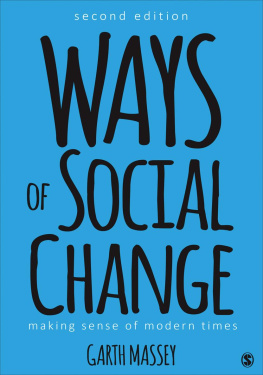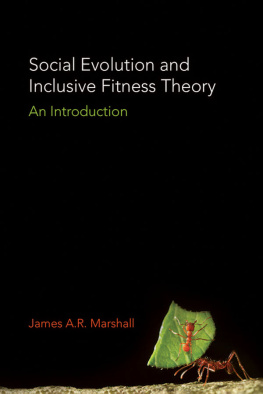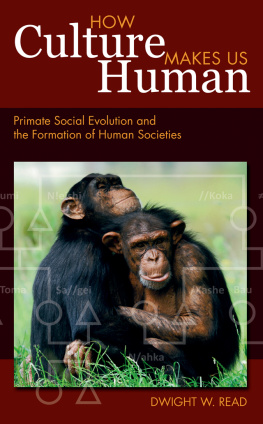Evolution Versus Revolution
Evolution Versus Revolution
The Paradoxes Of Social Change
Melvyn L. Fein
First published 2015 by Transaction Publishers
Published 2017 by Routledge
2 Park Square, Milton Park, Abingdon, Oxon OX14 4RN
711 Third Avenue, New York, NY 10017, USA
Routledge is an imprint of the Taylor & Francis Group, an informa business
Copyright 2015 by Taylor & Francis.
All rights reserved. No part of this book may be reprinted or reproduced or utilised in any form or by any electronic, mechanical, or other means, now known or hereafter invented, including photocopying and recording, or in any information storage or retrieval system, without permission in writing from the publishers.
Notice:
Product or corporate names may be trademarks or registered trademarks, and are used only for identification and explanation without intent to infringe.
Library of Congress Catalog Number: 2015015314
Library of Congress Cataloging-in-Publication Data
Fein, Melvyn L.
Evolution versus revolution : the paradoxes of social change / Melvyn L. Fein, Ph.D.
pages cm
Includes bibliographical references and index.
ISBN 978-1-4128-5713-0
1. Social change. 2. Middle class. I. Title.
HM831.F45 2016
303.4--dc23
2015015314
ISBN 13: 978-1-4128-5713-0 (hbk)
Dedicated to the Memory of Irving L. Horowitz And his indomitable spirit
Acknowledgments
Social change is a complicated subject. If I have succeeded in untangling only a few of its most knotty features, it is not for want of effort. Like many members of my generation, I began my career as an idealist. Those of us who grew up in the wake of the Great Depression and the shadow of the Second World War knew that much was expected of us. We were asked to solve the problems of poverty and injustice our parents had left unresolved. Because we were presumably the best-educated cohort to deal with these issues, we were to use the knowledge we had acquired to advance human communities to unrivaled heights. In short, we were required to save the world.
This task turned out to be more difficult than most of us imagined. The ideals we were encouraged to pursue were, as I and others learned, to our dismay, unattainable. The nature of human beings, and social change, is such that the ideals were never possible. Nevertheless, this unwelcome truth took years to sink in. Although my personal experience played a part in recognizing our shared limitations, had I not been privy to the discoveries of others I would have remained in the dark. I therefore wish to thank some of those who helped open my eyes.
So many people were involved in teaching me critical lessons that not everyone can be acknowledged here. Besides the information I acquired from books, which was substantial, I also owe a considerable debt to Dr. Martin Lean for making me realize how much I did not know and to Dr. Vasili Economopoulos for the example of patience he provided. With respect to this work, I must specifically acknowledge the encouragement I received from Dr. Irving Horowitz. Not only did he publish my book Post-Liberalism, but he recognized that it offered a nonconservative alternative to liberal orthodoxy. I am also grateful to his wife, Mary Curtis, who now runs Transaction Publishers. She too understood that I am attempting to synthesize a host of materials, thereby presenting a new way to look at them. Investigations into social change are not new; my small contributions did not invent the wheel.
Whatever their virtues, they build upon the efforts of other scholars. They too are, thus, the product of a long evolution.
I must also thank the many students upon whom I practiced my ideas. Without their feedback, I could not have refined my thinking. In having to voice what I thought out loud, and doing so in a manner that could be understood, I was forced to clarify my hypotheses. Time to achieve this was also provided in an extended leave allowed me by Kennesaw State University. The space to write was not only a luxury, it offered an opportunity to integrate my thoughts.
Finally, I am indebted to Kathryn Siggelko for helping me to create the figures in this work and Shari Sheridan for saving me from the evil grasp of my computer. Nor can I neglect my wife, Linda Treiber. Her support and tolerance in what turned out to be an all-consuming project were invaluable.
Contents
1
The Strangeness of Social Change
Expositions
The juxtaposition was striking. The buildings were faux classical. Clad in white stucco, they appeared to be constructed of marble and sought to recapture the glory of ancient Rome. took barely a year to erect. What was more, it dazzled the eye both day and night. Rome might have been the wonder of its age, but it offered nothing to compare to the triumphs fashioned by the genius of American science and industry.
Just four hundred years after Columbus discovered the New World, Carved out of a wilderness, it rose from the ashes of a devastating fire to become a stunning metropolis. Located at the crossroads of the Great Lakes and multiple railroad lines, it throbbed with commercial activity. What better symbol was there of the countrys enormous successes and scintillating promise? What better emblem of the changes its people had wrought and the miracles they would achieve?
The United States was a relatively new nation. Nowhere had a society started with so little and accumulated so much in so short a period. Its know-how could accomplish almost anything. No wonder beneficial change seemed inevitable. For most of human history, however, ordinary persons simply hoped things would not get worse. If conditions remained the same, without a famine or war, people were content. To them, the world was a veil of tears from which only God could deliver us; hence, to aspire to intentional improvements was to appropriate the deitys prerogatives. During Europes Middle Ages, The best they could anticipate was that if people followed the Lords dictates, the millennium would shortly arrive.
Conscious efforts at major change have been the exception. The Egyptian pharaohs Even then the objective was limited.
For most of history, change was a matter of political turmoil and/ or religious conversion. Kings rose to power but were later replaced by their sons or ambitious usurpers. Empires, such as that of the Persians, burgeoned from the obscure tribes, then disintegrated under the attacks of an Alexander the Great. His goal was not to foment a revolution, but to enhance his personal power.
Religion could often be more idealistic. Life was hazardous; hence, appeasing the gods was essential. This made the services of soothsayers imperative. Only they could read the intentions of the deities. Croesus, for instance, consulted the Delphic Oracle when deciding whether to war against Persia. And when told that a great empire would prevail, Croesus mistakenly thought it would be his. Priests also offered up sacrifices to their divinities and prayed for their favor. This was why the Jews trooped annually to Jerusalem to offer sheep at Solomons Temple and why the Greeks erected magnificent stone edifices dedicated to Zeus and Athena. Their objective was to guard against disaster, not to remake the world.


